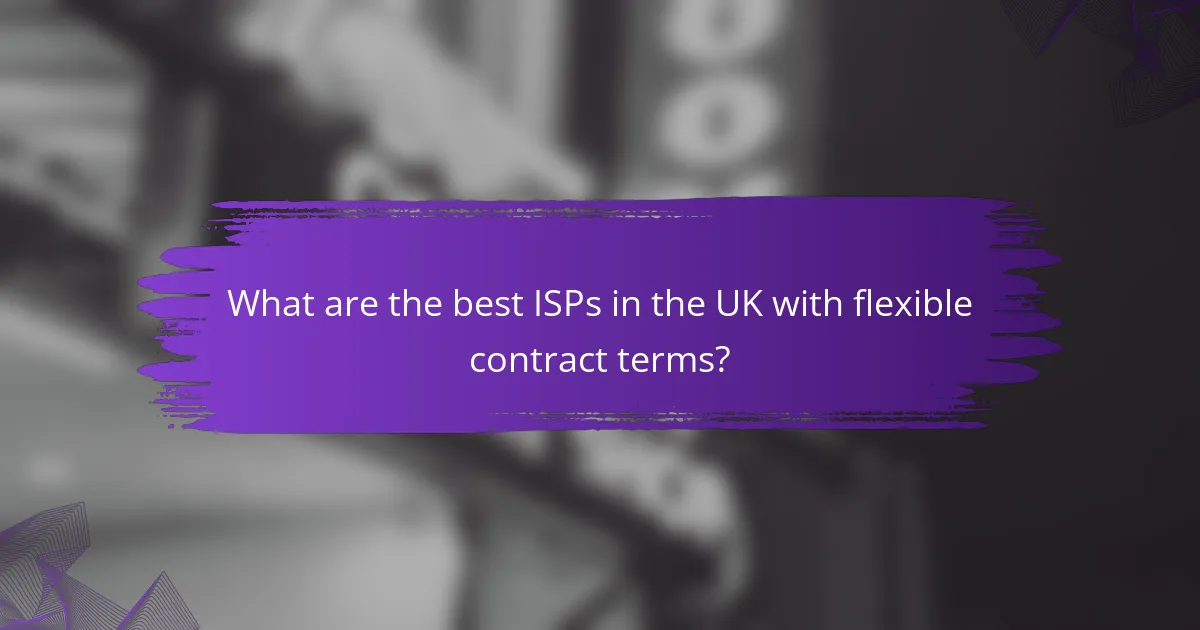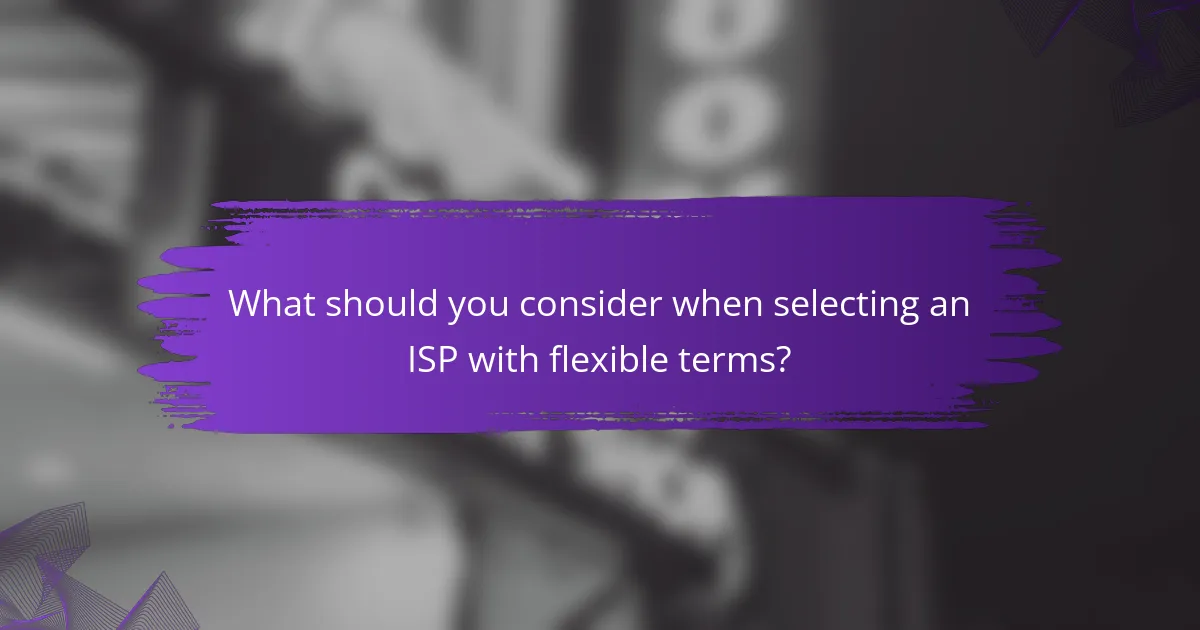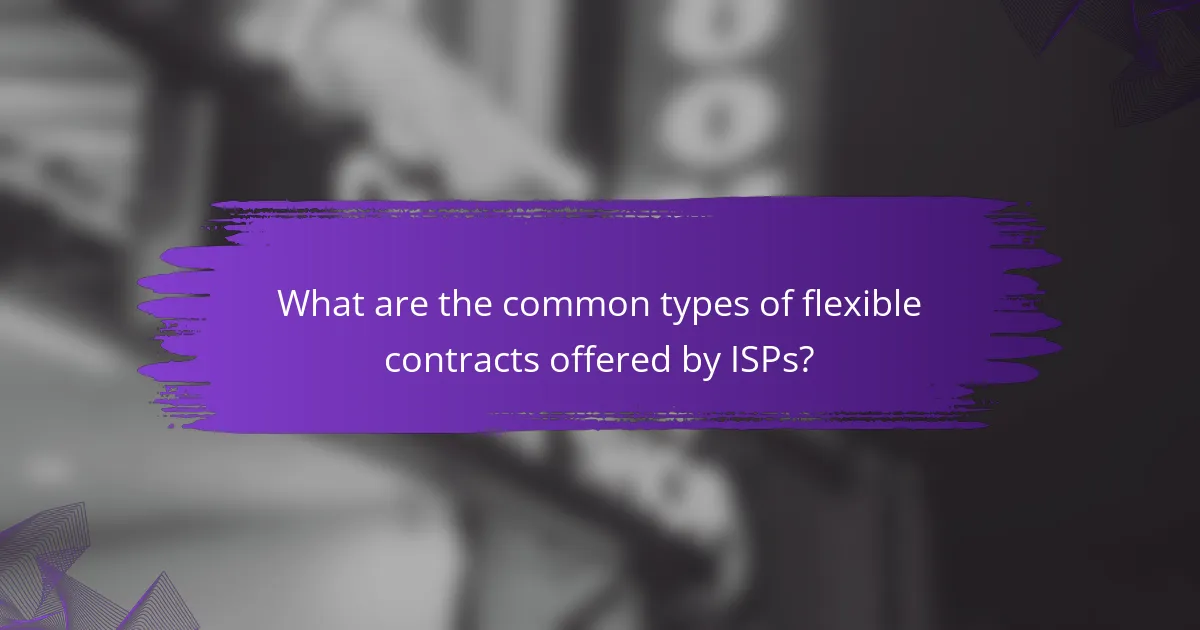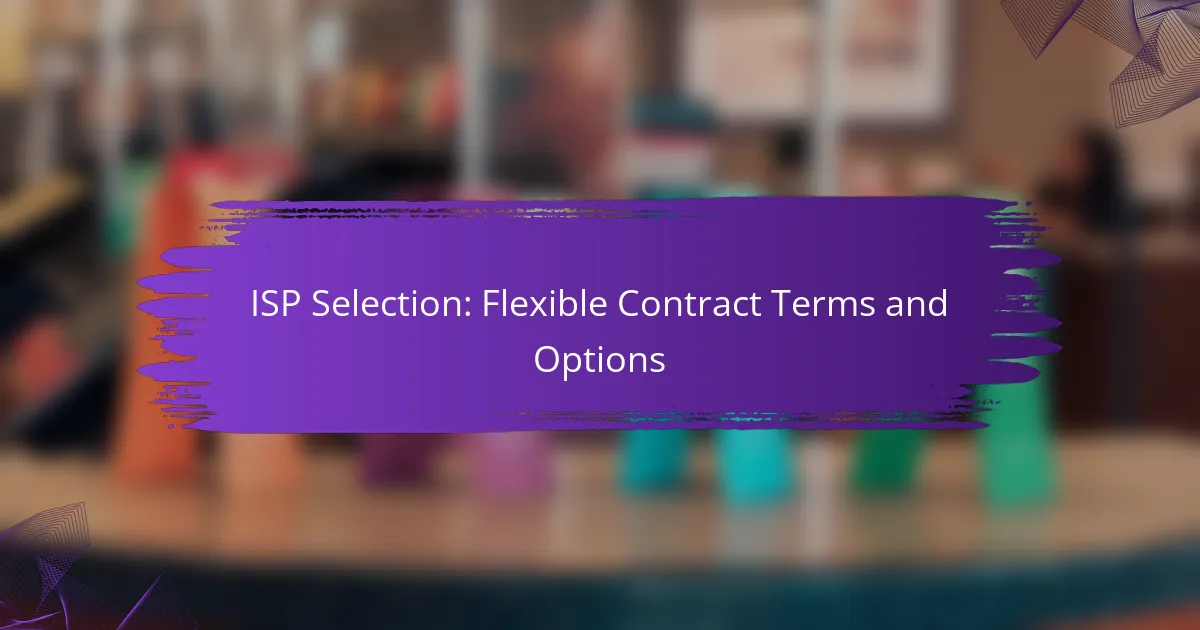Choosing an Internet Service Provider (ISP) with flexible contract terms can significantly enhance your online experience by allowing you to select plans that align with your current needs. In the UK, major providers like BT, Sky, Virgin Media, TalkTalk, and Plusnet offer various options that cater to different preferences without the burden of long-term commitments. By considering factors such as contract length and service quality, you can find a plan that not only meets your requirements but also provides the freedom to adapt as your needs change.

What are the best ISPs in the UK with flexible contract terms?
Several ISPs in the UK offer flexible contract terms, allowing customers to choose plans that suit their needs without long-term commitments. Key providers include BT, Sky, Virgin Media, TalkTalk, and Plusnet, each with unique offerings that cater to different preferences.
BT Broadband
BT Broadband provides a variety of flexible contract options, including short-term plans that can last as little as 12 months. Customers can select from different speeds and packages, making it easier to find a plan that fits their usage and budget.
BT also offers a money-back guarantee, allowing users to cancel within the first 30 days if they are not satisfied with the service. This feature adds an extra layer of security for those hesitant about long-term commitments.
Sky Broadband
Sky Broadband is known for its flexible contracts, often offering 18-month plans alongside options for rolling contracts. This flexibility is ideal for customers who may want to change their service or move homes frequently.
Sky also provides various packages that include different speeds and additional features, such as Sky Q for TV services. Customers should consider their internet usage to choose the best package for their needs.
Virgin Media
Virgin Media offers a range of broadband packages with flexible contract lengths, including options for 12-month and 18-month agreements. Their services are known for high-speed internet, which is beneficial for heavy users or households with multiple devices.
Additionally, Virgin Media often runs promotions that can include discounted rates for the first few months, making it an attractive option for new customers looking for value.
TalkTalk
TalkTalk provides flexible contract options, including 12-month contracts and no upfront fees for certain packages. This makes it a cost-effective choice for budget-conscious consumers.
They also offer a variety of broadband speeds, allowing customers to select a plan that aligns with their internet usage. TalkTalk’s straightforward pricing structure can help avoid unexpected charges.
Plusnet
Plusnet is recognized for its customer service and flexible contract options, typically offering 12-month contracts. Their plans are designed to be straightforward, with clear pricing and no hidden fees, making it easier for customers to understand their commitments.
Plusnet frequently runs promotions that can include reduced rates for the first few months, making it an appealing choice for new customers. Their focus on customer satisfaction can provide peace of mind for those who prioritize support and reliability.

How do flexible contracts benefit consumers in the UK?
Flexible contracts provide UK consumers with the ability to adjust their internet service plans without long-term commitments. This flexibility allows users to choose plans that better match their current needs, reducing the risk of overpaying for unused services.
Lower commitment risks
Flexible contracts minimize the risks associated with long-term commitments, which can be particularly beneficial for consumers who may move or change their internet usage patterns. With options that allow for shorter terms or easy cancellations, users can avoid hefty early termination fees that often accompany traditional contracts.
For instance, many ISPs in the UK now offer rolling monthly contracts, allowing consumers to switch providers or plans with minimal hassle. This approach empowers users to make choices based on their evolving needs without being locked into a lengthy agreement.
Adaptability to changing needs
Flexible contracts enable consumers to adapt their internet services as their requirements change. For example, a household may need a higher bandwidth plan during periods of remote work or online learning, but can downgrade during quieter times without penalties.
Many ISPs offer the option to upgrade or downgrade plans with little notice, often within a few days. This adaptability is crucial for consumers who want to ensure they are only paying for the services they actively use, making it easier to manage monthly budgets effectively.

What should you consider when selecting an ISP with flexible terms?
When selecting an Internet Service Provider (ISP) with flexible terms, consider contract length, early termination fees, and service quality. These factors will help you find a plan that meets your needs while providing the freedom to adjust your service as necessary.
Contract length options
ISPs typically offer various contract lengths, ranging from month-to-month plans to one or two-year agreements. Shorter contracts provide flexibility but may come with higher monthly rates, while longer contracts often offer lower rates but less freedom to change providers. Evaluate your internet usage and future needs to choose the best option.
For example, if you anticipate moving soon, a month-to-month plan may be ideal. Conversely, if you are settling in for the long haul, a longer contract could save you money.
Early termination fees
Early termination fees (ETFs) can significantly impact your decision when selecting an ISP. These fees are charged if you cancel your contract before the agreed-upon term ends. They can range from a small fee to several hundred dollars, depending on the provider and the remaining contract length.
Before signing, inquire about the ETF structure. Some ISPs may waive fees under certain conditions, such as moving to an area without service. Understanding these fees can help you avoid unexpected costs.
Service quality and reliability
Service quality and reliability are crucial when selecting an ISP. Look for providers with a reputation for consistent performance, low downtime, and good customer support. Research user reviews and independent reports to gauge the reliability of potential ISPs.
Consider the type of connection offered, such as fiber, cable, or DSL, as this can affect speed and reliability. Fiber connections generally provide the best performance, while cable and DSL may vary based on location and infrastructure.

What are the common types of flexible contracts offered by ISPs?
ISPs typically offer several types of flexible contracts to accommodate different customer needs. These include no-contract plans, rolling monthly contracts, and short-term fixed contracts, each with unique features and benefits.
No-contract plans
No-contract plans allow customers to subscribe to internet services without a long-term commitment. This flexibility is ideal for those who may move frequently or want to test a service before making a long-term decision.
While no-contract plans often come with higher monthly rates compared to longer commitments, they provide the freedom to switch providers or plans without penalties. Customers should compare the monthly costs and any potential installation fees to ensure they are getting a good deal.
Rolling monthly contracts
Rolling monthly contracts offer a compromise between flexibility and commitment, allowing customers to enjoy services on a month-to-month basis. These contracts automatically renew each month unless canceled, providing convenience without a long-term obligation.
When considering rolling contracts, it’s important to check for any price increases after an initial promotional period. Customers should also be aware of the cancellation notice period, which can vary by provider, typically ranging from a few days to a month.
Short-term fixed contracts
Short-term fixed contracts usually last between six months to a year, providing a balance of cost savings and flexibility. These contracts often come with lower monthly rates compared to no-contract or rolling plans, making them appealing for budget-conscious consumers.
However, customers should be cautious about early termination fees, which can apply if they wish to cancel before the contract ends. It’s advisable to read the terms carefully and consider future needs before committing to a short-term fixed contract.

How do pricing structures vary among UK ISPs?
Pricing structures among UK ISPs can differ significantly based on contract length, speed, and additional features. Customers should consider these variations to find the best value for their needs.
Monthly subscription fees
Monthly subscription fees for UK ISPs typically range from around £20 to £60, depending on the speed and service level. Basic packages may offer lower speeds at the lower end of this range, while higher-speed options or bundles with extras like TV can push prices higher.
When selecting a plan, evaluate what speed you require based on your internet usage. For example, casual browsing and streaming in standard definition may suffice with lower-tier plans, while gaming or streaming in 4K often necessitates higher-speed packages.
Be aware of promotional pricing that may apply for the first few months, as many ISPs offer discounts to attract new customers. Always check the standard rates after the promotional period ends to avoid surprises in your monthly bill.
